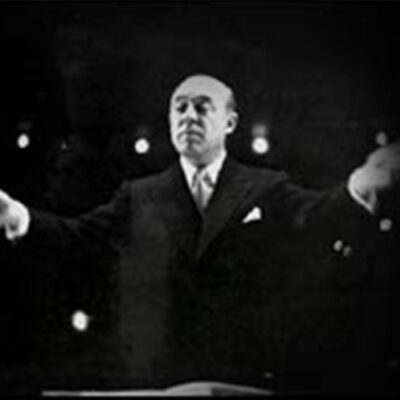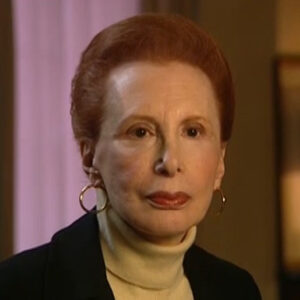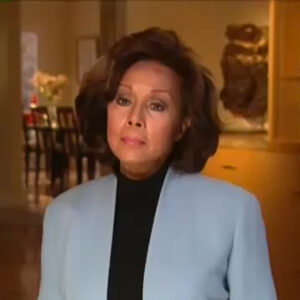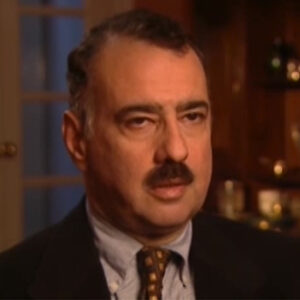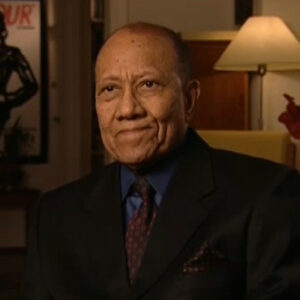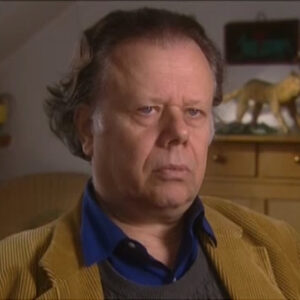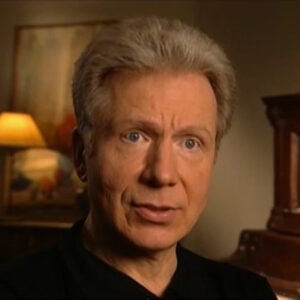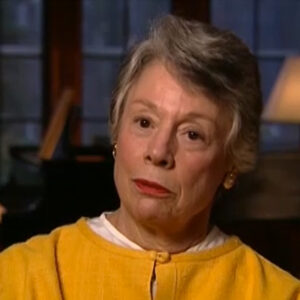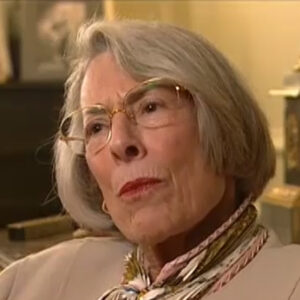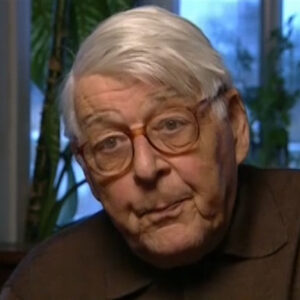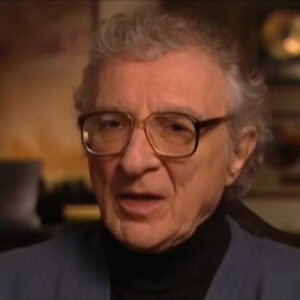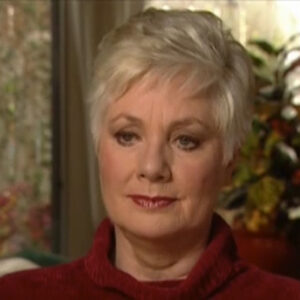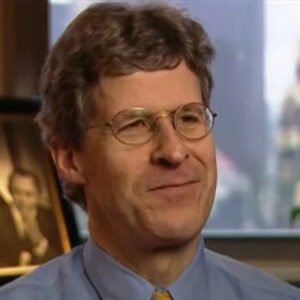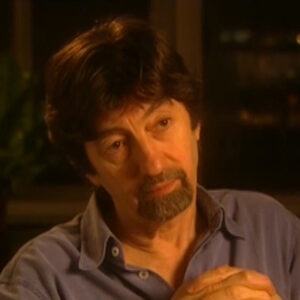Speaker 1 It it all comes down to Rogers, it always has he is the most played composer of any kind of music who ever lived. This is not negotiable. Think about it. But Beethoven, Irving Berlin, anyone the the diversity of the of the Louvre, if you will, or even if you own this stretch of time from the song Manhattan, Rogers claimed that song Manhattan made Rodgers and Hart. I guess he’s right. But I mean The Sound of Music at any given moment, we’re sitting here now, someone somewhere on the planet, and perhaps more than 300 or 3000 are singing or contemplating performing a melody by Richard Rodgers. And this is another century. I never heard a vulgar note in any piece of music written by Richard Rodgers. I’m not crazy about slaughter on Tenth Avenue, but I, I, I do feel that he was incapable of making making a vulgar decision and he made many surprising decisions in his melodies. For example, there is a note in isn’t it romantic? A single note that holds the whole thing together. Da da da da da da da da da da da da da da da da da da da da da da da da da da da da da da da da da da da da da da da da da da dum. Da da da da da da. We were meant for love. That note is out of the blue and then it slips into then isn’t that romantic? And goes right back to the theme of the piece and the title of it. But what a surprise. The bridge of they can’t take that away from me. People miss it. They miss it all the time. Singers they go da da da da da da da da da da da da da da da da. It’s not that at all. There’s a half tone in there that I know that I don’t that I’m done and that I’m done. And now these are just two to little surprises that Rogers has to offer. But what he offered constantly was melody. Amazing, stunning, life changing melodies, little little Rogers factory of melodies from the early 20s until he died, spectacular melodies, melodies that move the stories of his shows forward with the lyrics applied to them, however frivolous those stories were in the case, let’s say the Rodgers and Hart shows whatever was there to be moved forward was moved forward by what Rodgers had to offer. He wrote almost entirely to story to character. Alan Jay Lerner said that a good song in a show would would do the same job as twelve pages of libretto. And that’s what what Rodgers was aware of as a composer for the theater.
Speaker 2 What do you have in. You talk about Melody. Tell us what makes a Richard Ryders conversation so Richard Rogers that no one else could be.
Speaker 1 Well, I didn’t say that no one else could be. I just said that a melody, the choices that a composer makes and creating a melody are numerous, obviously, harmonically and melodically. And those notes somehow out of Roger’s piano, when placed together as a 32 bar melody, created a total piece of integrity of melody. The way the way the we Mozart did. Rogers was a miracle of business integrity. And he was very much like a businessman. Only his job was to go to the piano, which he did. But he was a businessman. But as a businessman, he was entirely moral. And his melodies, ranging from the the Up-Tempo Things with with Larry Hart that have about them as a jazz possibility many years later called upon by jazz musicians. I you took advantage of me as a classic example, but thou swell is is another and there are dozens of this Kappy love. It’s silly for me to sit here and name all these songs, but they’re beautiful melodies and and they’re they’re so rhythmic. And if you address the ballads and you take a look at the Rodgers and Hart, things like where or when, for example, which is a perfectly beautiful melody, you’ll find the utmost integrity, the lack of vulgarity in the choices made by Richard Rodgers. Other composers, in my opinion, behaved in much the same way. I think my father, Arthur Schwartz, certainly is is one of them. And George Gershwin was so blindingly active that it’s and there were so many notes that just the the the mere dazzle of it all, plus his his his so-called classical music, an American in Paris, the concerto in F, which I love or almost prevents him from being included in this, although, of course, he was a great American composer. There there there are notes and ideas from other composers that I disagree with. And I it’s kind of like if you’re looking at big bands and you say that Artie Shaw was perhaps the best big band and the most interesting melodically, and then you go to something as pedestrian as, let’s say, the Ralph Flanagan Orchestra, there are composers, composers who would be the Ralph Flanagan of decision makers. And then there’s the Artie Shaw. Same thing with arrangers, Conrad Salinger for the movies, Nelson Riddle for the recordings. They seldom issued a cheap idea. Rodgers never did, to my knowledge. And I know most of his work.
Speaker 2 Someone told us that Rogers composes with the audience in mind, Singer on the stage and the orchestra in the back and knows exactly how long it takes for the time for the singer to reach the audience. How much time to give the audience cognition? I mean, it sounds like an amazing it’s not just playing the piano and composing the songs. Can you talk about that idea?
Speaker 1 I’d be happy to. I did. In telling you that Rogers wrote for a story. He wasn’t a songwriter out there writing popular songs. He was one of the few men who understood the architecture of a score. There were very few of them. Many of the great ones did not. I believe that Julie Stein did. I believe that Frank Loesser did. I believe that Lerner and Loaded and Rodgers and Hammerstein did. And you’ll find Rodgers thoughts on this in his own book musical stages. So you say someone told you. I’m telling you that Rodgers himself told you because he talks about writing for a character, as I as I mentioned earlier, and for a story to move that story forward, to occupy those 12 pages of Alan J. Lerner’s hypothetical libretto with a three or four minute number that advances the plot, he did that as a genius.
Speaker 2 If I could ask you not to say, as I said before, because we never know what we’re going to use.
Speaker 1 I’m sorry. That’s OK.
Speaker 2 That’s OK. Can you just go a little deeper into what you mean? Tell us again about the architecture and how he did the.
Speaker 1 What what will the architecture of a of a Broadway show with a story, it seems to me, is how to tell the story. It’s the problem that any creative person has as a short story writer, as a novelist, even as a journalist or a documentary filmmaker, however neurotic they are as a group, you understand it’s telling the story. And Rodgers told his story with music and with literature that Oscar Hammerstein provided. And he told it on a stage with choreography, dancing with costumes, with scenery, with lyric and with his own melody. If you can imagine the very first moments of Oklahoma, which represent the very first moments of Rodgers and Hammerstein, a man comes out on the stage, a bare stage with an orange Kansas sky or Oklahoma sky, Midwest sky and sings Oh, what a beautiful morning. Oh, what a beautiful day. I got a beautiful feeling. Everything’s going my way now. What what is Oklahoma about, really? It seems to me that it’s about a guy named Curly who wants to take a girl to a dance and does. That’s the story of Oklahoma. This story is told, of course, with the subtexts and metaphors of Judd and and so on, so divinely by the combination of Agnes to the choreographer and Hammerstein and of course, Rodgers. And keep in mind, over the beautiful morning is a waltz. And for me, there has been no greater composer of the waltz than than Rodgers, he puts anyone in the world name Strauss, ever born, name Strauss to shame Oklahoma. I mean, just just think out of my dreams is a titanic work, a cathedral of work. It is a waltz. But people forget that because. Because the songs are relating to their circumstances so intimately that one forgets the form chosen by the composer. So when I say to you, Oh, what a beautiful morning is a waltz, I wonder if you ever thought that out of my dreams is a more transparent waltz. A wonderful guy is a waltz. I’m as corny as one, two, three, one, two, three. He was able to express himself through the waltz. Why is that? One could look at his time of life to to see when he was born, what his childhood was like, where waltzes came from in his own heart and soul. And you will see that this magical musician had waltzes in his on his skin and in his blood and he was able to use them and disguise them. Oh, what a beautiful morning is is a waltz. And they’re in their flagrant waltzes, such as the Carousel Waltz, such as Falling in Love with love is a great waltz, the most beautiful girl in the world. It’s a great waltz. One of the great melodies is Lover, which is a waltz that just comes down the scale half ton. Da da da da da da da da da da da da da da da da da da. That was that musical idea was out there for someone to pick off the tree. What, you didn’t do it and I didn’t do it. Rogers did it. And after picking the fruit, he molded the piece of fruit into a waltz, just half tones going down. But with a one, two, three, it became beautiful.
Speaker 2 Fantastic. Let’s go back in time and your time. Talk about meeting him for the first time and tell us about watching the King and I.
Speaker 1 Roger was sorry again, Roger was always a part of my life because my father was a contemporary and they were social friends and I was brought into this world, for better or worse, by Roger’s brother, Morty Mortimer Rogers. And we had a dog given to us by the Rogers wirehaired terrier named Maude, who was very much a part of my early life, lived to be 12 or 13 years old, which is in dog dog time, one hell of an existence. But it was a Roger’s gift. And I began to notice when I became conscious that every year, because we shared the same birthday, June 28th, me and Dick, I would get a telegram from him. Now, obviously on his side it was sectarianly arranged, but who cared? And wherever I was as I grew older and in that would encompass all kinds of places where I was living on my birthday from Palm Springs, California, to to London to Paris, to Boston, to New York. Los Angeles. One year was San Francisco. There was a knock on the door or there was that that Western Union envelope on the on the floor, that knock on the door, the envelope on the floor. And it was Rogers saying to me, I hope we all have you and I to be 200 years old. Once again, my congratulations. And of course, when he died, the telegrams died. And I miss them just to hear from Rogers on a specific day, your birthday throughout your life, never missing. Once, however, Secretary Lee arranged it was didn’t matter to me. It was from Richard Rodgers and I had several moments alone with him. One was particularly. Touching. In 1951 when I was 13. The king and I had opened to these spectacular reviews. And Rogers wanted to hear the overture one Saturday matinee, just the overture, and he took me, I’ve forgotten the circumstances around which we were operating, but he took me into the theater just to hear the overture. The lights went down and he and I stood in the back of the theater to hear the overture to the to the king and I. Now, what does that mean? It means getting to know you. And we’re still happy to have you. Hello. Young lovers and I have dreamed all in a little package, totally invoker melodies, every choice on the money, every note, every harmonic harmonic value. And I remember seeing Rodgers with this enormous personal pleasure. His face did not explode into laughter or pleasure. Very often it wasn’t that an explosive kind of a face to jail for someone like Jonathan that he didn’t. Not that I remember. I could invent something, he turned to me and he said, Jonathan, you’re simply the finest young man I’ve ever met. I think you’re artistic. I think you’re intelligent.
Speaker 2 And you’ll be on the radio sometime
Speaker 1 and you’ll be on the radio. Well, that was all right. I knew that already.
Speaker 2 So you were standing there in the
Speaker 1 back and the look on his face in hearing his music in this little package called an overture, it was filled with pleasure. Roger’s face didn’t often explode in pleasure or in in and light hilarious laughter. He was a very contained man, somewhat cold, in fact. But the look on his face that day, I had never seen before and never saw again. It was great pride. I wouldn’t call it humble. He knew who he was, but I would call it beatific. Almost a gesture of a kind of overview as a witness to this music. And his overview was giving him pleasure, which he was sharing with a young man he knew to be appreciative and knowledgeable. And then we left the theater.
Speaker 2 Can you tell us he was so 51, you would have been 49 years old? Mm hmm. Can you tell us he was forty nine years old and then you left the theater and did you say, OK, let’s just go, that’s enough. I’ve seen enough. Come on, kid. I mean, what was OK,
Speaker 1 he had made it clear beforehand that we were just going to hear the overture, that we were just going into the theater. What I like to come with him, I giving it no thought at all, agreed to come with him. We heard the music. I had seen the show already in that first week and was very familiar with every note of it and let alone the overture and the experience of of standing next to Rogers. But we were together. I mean, we had come in together as a team, Jonathan and Rogers together. And when the overture ended in the audience applauded. He just turned and I followed dutifully and and we left the theater. And after this supreme moment, we were out on the street blinking in the spring sunshine of a Saturday afternoon. But his his face, his pleasure, the very Rogers of him was italicize for me forever that day.
Speaker 2 You said there was a second moment, something else when you were with him, could you talk about that when that was?
Speaker 1 I’m interested in what composers have to say about their own songs and does any song work for them as their favorite song, and Rodgers was unmovable and he had a little boring rap whenever I would ask him. And the rap went something like this. Well, you know, there’s so many songs that I like for so many different reasons. I like where or when on a Tuesday because whatever on Thursday I enjoy if I loved you. So I really can’t say, Jonathan, what my favorite song. Yes, he was absolutely unmoveable off that coin. Until. An afternoon again in a theater, this time at the Colonial in Boston. Do I hear a waltz? There’s that waltz. Word again was in tryout and Rogers and I were were in the lobby. And I tried them out again, Dick, I did call him Dick, I don’t know when that was established, but it was that I had permission to do so. I just always wanted to call him Rogers, but I called him Dick. What what is what is your favorite song? And there came that rap as if he had never given it to me before. Well, you know, there were so many songs that I like for so long with a song in my heart. He suddenly blurted out. Declaratively, no, but no, for this reason or that reason, he gave me an answer with a song in my heart da da da da da da ba ba ba ba da da da da. Rodgers and Hart. That was his favorite song, I am here to tell you.
Speaker 2 Thank you, fantastic. Um. You’ve talked about a lot about Melody, you’ve talked about loss, if you say them again, that’s fine. Tell us as if you haven’t, what device is this? You use it through your.
Speaker 1 I don’t think of devices at all, I think of the whole I think of the melody. I it’s to me it’s a seamless work that was born from genius. And I I mean, there’s a Jimmy Van Heusen device, often used word Van Heusen will write a melody that that that gradually ascends. Take the Tender Trap that @ @ @ @ @ @ @ @ @ @ @ @ @ @ @ @ @ End. Call me irresponsible. Ba ba ba ba ba ba ba ba ba ba ba ba ba ba ba ba darn that dream da da da da da da da da da da da da da. That’s a device I’m aware of that Van Heusen was attracted to it. I am unfamiliar with Rodgers devices because I don’t want to be familiar with Rodgers devices. The melodies are so magnificent and seamless. And finished that I have very little interest in exploring the the journey that Rogers made.
Speaker 2 When he burst on the scene. We can’t tell us about that. He was there competition and what made them distinctive stand out from from those.
Speaker 1 Rogers said himself throughout his life that the song Manhattan made Rodgers and Hart to to say that they burst on the scene is, I guess, both true and untrue until the song Manhattan, because they worked at their craft. There’s just no question that there was a big age difference between the two men. Seven years, I think it was. But the the scene, such as it was, was getting getting cooking Broadway shows were investigating less formal modes of communication in music, moving away from the Rudolph criminals and the Sigmund Romberg, however beautiful those melodies were and are. And here was Rodgers and Hart. They they were talking. They were they were talking to people. They were writing the music of the streets, the the restless energy of a thou swell, the the the great Up-Tempo songs like The Lady is a Tramp, as well as the cascade of waltzes. The waltzes inhabited the streets. They were contemporary. They were new. They were fresh waltzes. They they were their cummerbund was loosened and taken off. Their shirt was unbuttoned as opposed to, let’s say, the Blue Danube Waltz, which is a very formal experience. But falling in love with love, along with its heartbreaking lyric, Falling in Love with love is falling for make believe. Falling in love with love is playing the fool. It’s it’s an extraordinary work, in my opinion. Hard to sing to falling in love with love. But it was the intoxicating energy that flowed from a small group of men in New York. In the 20s, of course, Irving Berlin and George Gershwin later joined at the in the late 20s by Arthur Schwartz and and Harold Arlen. And of course, there was everyone’s God, Jerome Kern, who was in a sense, a kind of crossover figure, and that he emerged more from the familiar Rhomberg world, but then was able to write later on. Nothing’s impossible. I have found for when my chin is on the ground, I take a deep breath. Who would think that’s a Kern melody or I won’t dance. Don’t ask me. Or a fine romance, my friend. Those are all Up-Tempo Kern songs. I wonder if Rahmberg could have done that. I don’t think so. Of course Rodgers could do anything. He was totally ambidextrous. It’s like my own father who had who was ambidextrous literally and played tennis with no backhand. He would just put the racket in his other hand, which I deemed unfair. But Rodgers, as you say, exploded onto the scene. I’m imagining this little business man exploding. I mean, it’s too imposing a word to apply to him, though. He did have heroes. One of them was Noel Coward.
Speaker 2 Let’s wait one second. While this jet passes over, pick up here. Tell us we’re
Speaker 1 good. Though he did have heroes. He often told the story and I believe he included it in his autobiography, which is essential reading if you’re interested in this stuff. It’s called Musical Stages of Working and Writing with Heart. And it was lunchtime and he realized he hadn’t had anything to eat. And there was a restaurant in the 40s, two or three little steps down. And and as he approached the restaurant, he was by himself. He saw sitting at a table with three or four other people, Noel Coward, a man he richly admired. And he went in and he he just gotten into his head to introduce himself. Now, at this time, Manhattan was out there, that song, and he went over to Howard’s table and said, Mr. Mr. Coward, I’m a I’m a composer. My name is Richard Rodgers. And I went with that. Noel Coward stood up, took Roger’s hand warmly and said, Oh, I love your work. Manhattan is such a wonderful song. It’s just wide open and wonderful. And and it’s a terrific lyric. And as your other songs and he named a few of the. Obscure Rodgers and Hart songs that had been concocted and believe me, there were a lot of obscure Rodgers and Hart songs at that moment, and Rodgers thanked him so much. And and after Howard sat down, Rodgers kind of backed away and and and went out and left the restaurant. And it took him a good 10 minutes before I realized that he had done it. And he he was just so overwhelmed. He just left the restaurant. He’d gone in for this little meeting with Howard and and didn’t have lunch. That day of Rodgers inhabited the popular music world. He indeed drifted out to Hollywood like everyone else with Larry Hart. They wrote a film, I think it was called Mississippi, but he was a theater man. He had one interests, one interest, and that was to write music to stories for the stage. And he’d be the first to tell you that if he were sitting here and I wish he were so I could tell him how much I love him. But he’s not sitting here, but that was what he did, he found a story that he wanted to spend a couple of years with. He figured it out. He wrote in his head a great deal when he was ready to compose. A lot of it was already done. Before he sat down at the piano, he always had Oscar and they weren’t great friends. As a matter of fact, the lyric to Hello Young Lovers, Oscar’s put in an envelope and sent to Rogers. I had occasion to speak on the phone and spoke about other subjects for a good ten minutes before Hammerstein said, What do you think of my lyric, Roger? Said Scott. Hello, young lovers, imagine that Ilari heart was in a very elusive alcoholic man and a very sad and wonderful man, I know a lot about him because my father knew him very well and I just so admire him and and their body of work. But the two bodies of work have something in common, and that’s Rogers. And that’s why he’s the most played composer of any kind of music who ever lived any kind of music. And there’s no obscure good don’t give me any crap about Rio de Janeiro. And there’s a guy down there who’s played all over the world and it’s all of his bossa nova things. That’s not true. The bossa nova, first of all, wasn’t invented until four years ago or whatever. I mean, right now, think of the people singing my favorite things, just that alone, let alone happy talk or some Sinatra record of of of where or when or I have dreamed.
Unidentified Um. We know there
Speaker 2 was a sea change in musical theater between the collaboration of Hart and Hammerstein. Talk about the difference in the music itself between the two of them. Was it and tell that was lost with Rodgers was lost. Regained.
Speaker 1 I think there’s a great deal was gained and nothing was lost. Life is nothing, if not change.
Speaker 2 And I’m sorry, this is one of those times I need to hear hard and Hammerstein.
Speaker 1 I see. Right. That’s a
Speaker 2 perfect answer.
Speaker 1 I think everything was gained and nothing lost when Rogers began to work with Hammerstein. Life is nothing, if not change. And you must remember that Rodgers and Hammerstein came together during the Second World War, which itself had followed briskly the Depression so that the whole world was a calamitous puzzle. And into that world strode Rodgers and Hammerstein with a whole different point of view of what to put on the stage, real stories told with dancing and with emotions, rather than absolutely synthetic figures who inhabited, however gracefully, the Rodgers and Hart Enterprises, where songs were like Tinsley’s on on a cheap little Christmas tree of a libretto. The Rodgers and Hammerstein shows one right after the other, carrousel being my favorite and Rodgers hence my favorite, the the stories of these shows and of course. South Pacific. And the king and I, those those songs grew out of those stories, they say they are they are so indigenous to their stories. And this this, it seems to me, had a had a bearing on how Rodgers wrote his melodies, because now he was writing for more full bodied people, not just cartoons. And so particularly with Oscar Hammerstein’s different kind of lyricism and also the absence of Larry Hart’s cynicism encouraged, in my opinion, a different kind of performance from the composer. And if you think of Rodgers and Hart songs, and this is not a bad point, I think of one Rodgers and Hammerstein song that could have been written by Rodgers and Hart. The gentleman is a dope from Allegro. Could there be a Rodgers and Hart song written by Oscar and Rodgers? Yes, with a song in my heart. I would think there are others, but. But not too many. It was. It was a different emotional vocabulary, a different point of view of living that Oscar brought to Rodgers. And I think that those men had a great bearing on how Rodgers performed as a composer.
Speaker 2 Did you ever have any conversations with Rodgers about either of his is
Speaker 1 there is no.
Speaker 2 So what must have been like after the two most famous lyricists in the 20th century die and Roger sits there by himself and says, how do I go on?
Speaker 1 What he actually said, what Rogers actually said after Hammerstein died was, hmm. No strings, no strings, except our own devotion, no other bombs at all. He wrote his own lyrics. I was singing the title song of the show that came of it, No Strings, which I think is a terrific score. And after all, he had all of us experience. The sweetest sounds I’ll ever hear are still inside my head, the sweetest words I’ll ever know. Waiting to be said, please. This was a lyric writer who picked it up by osmosis and being around songwriters, and particularly the great lyric writers with whom he collaborated, and they were Larry Hart and Oscar Hammerstein. So I think that’s what Rodgers thought, aside from thinking and announcing after Oscar died, that quote, I am permanently grieved is what Roger said, and I believe him.
Speaker 2 We’re sort of jumping around here, let’s go back to Oklahoma one today might look at Oklahoma as a bit old fashioned. Can you talk about what was being done contemporaneously and what rules did they break?
Speaker 1 Well, they broke a number of rules. The first rule I broke was to bring the curtain up on a guy on a stage alone singing, Oh, what a beautiful morning. My God, they did it again at the beginning of South Pacific with Dita Muya. Just some French kids singing this little song. But again, even in a in a almost throwaway piece like that, even though it was a throwaway at the very beginning of South Pacific, it’s a beautiful melody that Rodgers composed for these little kids to sing. Ditmar, Oklahoma, told its story through dance and through an electrifying new image of Rhod of Rodgers and Hammerstein. There’s a song that is so smart. It’s called Many A New Day that it had a bum, bum, bum, bum, bum. I mean, it’s it’s it’s a brilliant song. You can also waltz to it if you wish. Well, I’m going to go one to three, but you can take it into the one, two, three arena. But Oscar Hammerstein’s lyric that that that is spoken or sung by a woman tells us all about her character and her relationships with men. And Rodgers melody, which is posing as an old fashioned melody, is as hip as you can get. So they were breaking rules right and left, but they weren’t arrested.
Speaker 2 Let’s cut for a moment. Could the. First, set it up for us what happens in this song and what’s the uniqueness that. Tell us about Paracel and what took place?
Speaker 1 I would love to talk about the bench scene as it’s known, and discuss the cathedral work of If I loved you because it it was called upon and put under great pressure. The song to establish the show 12 minutes into it, a lengthy scene involving two characters we do not know on a stage talking and then singing a long ballad. This opportunity. For Rodgers and Hammerstein. Was embraced without fear. And it was. It it it it it was treated to their rich intelligence, their theatrical knowledge, it is staged, as I say, only 12 minutes into the show. We don’t know these two characters, a young girl and a young boy, a kind of roustabout kind of guy, this Bigelow guy. And he’s talking to this girl, Julie Jordan. Have you ever had a boyfriend? He’s big and tough and but the audience is hardly settled into their seats. Granted, they’ve heard the Carousel Waltz, which I would say is so powerful that it still is resonating. So you’re willing to buy into this long scene. But the melody that Rodgers wrote and also the lyric that Hammerstein created enabled the characters to declare no love for each other, even though their supple and youthful. And Ruedi because of the word if. If I loved you, I don’t. Of course, words wouldn’t come in an easy way round in circles, I’d go if I loved you. I mean, the the if of it that Oscar provided and the melody that Roger surrounded the whole thing with are are irresistible, haunting to the heart. Honest. It’s interesting that they had they had written the song for another show. It was in Oklahoma only it was called People will say we’re in love, don’t throw bouquets at me, or then people will say we’re in love. One way or not, of course, the song resolves in the other direction. But Oscar, even before that, with another composer, Kern wrote a song called Let’s Make Believe I Love You and you make believe you love me. You know, just make this nonsense. We’re kidding around here. So once again, the if raises its little head if I loved you, but what they did was to write perhaps the greatest song of all time by anyone. All the things you are dancing in the dark to others up for consideration here. But I’d say that if I loved you for its moment, advance that story. If it enabled the show to happen without it, there’s no show because there’s no romantic tension. There’s no story to tell. So two people on a little hill with the leaves blowing and then this melody and then that lyric opened the window to the rest of the show, I’ve never known a song or seen a moment in a in a show that was more electrifying. Lay on the money on 80 different levels.
Speaker 2 Do you want to break it down more? Yeah, I just thought maybe you could talk about trying to pick that up as a fresh idea. Sure.
Speaker 1 The scene preceding the actual presentation of the song is is clearly one of the longest, the longest moments of dialogue between two people in a musical. I don’t know how long it is, but it’s very long and it precedes the song so that the whole moment is, what, 13 or 14 minutes? I’d say very, very long. And again, nothing else is on the stage. But these two people and what they’re doing for the audience is circling each other, the boy and the girl and the boy with a great deal of experience and the virginal Julie Jordan, so beautiful and so struck by the sexuality and and the bravado of this character that she suddenly finds herself stunned by. I know I I have had that experience of finding myself in a conversation with a woman who I I’m just made speechless by. It’s hard to to do anything but utter. Platitudinous responses, which essentially is what Julie is doing during that, and he’s actually on her egging her with questions, but she’s just stunned by his masculinity. And so the sexual tension, it seems to me, in what’s called the Bentzi is so powerful that it makes the scene fly by till they get to their hypothetical. If I loved you longing to tell you that afraid and shy, I’d let my golden chances pass me by. Soon you’d leave me off. You would go in the midst of day. Never, never to know how I’d love you if I’d love you so that the the the the power, the heterosexual power between the two characters in the bench scene gives its entire self to the song that flows from it. It could have been an hour, I wouldn’t have cared.
Speaker 2 Wonderful. Thank you. Um. They become such a force after Oklahoma and Carousel after the war, talk about how that shapes musical theater and how they might have affected and change and changed their contemporary people. They were competing.
Speaker 1 After the success of Oklahoma and Carousel, the other composers, many of whom were in California writing for films but wanting to write for the stage, Arthur Schwartz is one, Harold Arlen is another. And there are other people in New York. And of course, again, this is about seven years after the death of George Gershwin. And I’d like to add parenthetically that if Gershwin had lived, it’s interesting to speculate on how that would have altered the composition of Rodgers and Hammerstein, whether there would have been a Rodgers and Hammerstein, because George would have been writing classical music with his left hand and brilliant standard songs with his right at it. And I’ll tell you this, it would have prolonged the the spirit and the life of the form. There’s just no question that those guys in Hollywood, from Harry Jubi to Harry Warrender, Jimmy this and Julie that and Frank Loesser, who was out there, everything would have been altered had George not died. So it’s interesting to speculate on whether there would have been a Rodgers and Hammerstein at all. I do know that Rodgers approached IRA after George’s death and IRA demerged. That is something I know, I just don’t know the details about it. Talk to Michael Feinstein. But but because our subject
Speaker 2 is not could you just do that again? It’s so great and say IRA Gershwin,
Speaker 1 because we’re not sure what you want me to say,
Speaker 2 that he approached IRA
Speaker 1 Gershwin. I’ll say it again. I say it again. That’s really OK. Here we go. I do know that Rodgers approached IRA Gershwin and asked IRA, I believe in some indirect fashion through the publisher, Max Dreyfus. I think this was it. I’m not sure if IRA would be interested in collaborating with Rodgers. IRA turned it down for whatever his reasons. This is after George Gershwin’s death. But there might have been a Rodgers and IRA Gershwin collaboration and who knows what Oklahoma would have been like, let alone carrousel. It’s just one of those things where everything plays off everything else, not only in the theater or in music writing, but in all fields. Everything is related and everything counts. Don’t you think? I do. And the the Rodgers and Hammerstein collaboration just obviously changed the way we go about theater and in the process. Spawn’s Stephen Sondheim, who took it down and dirty a few years later into the lies we tell ourselves and others. That basically is what Steve does that that Oscar couldn’t an IRA and I would rather and Oscar raised Steve going to say that clean an Oscar raised Steve Oscar with all his. I’m as corny as Kansas in August, and I’m in love with the wonderful guy and the folks who live on the hill and my God, isn’t this one hell of a beautiful day? And Steve saying, wait just one minute, it’s raining. Is not a beautiful day. My heart is breaking. It’s in permanent disorder, and I don’t much care for you, I don’t mean Oscar. I just mean you, Bill or Helen. Steve moved it into into the darkness where Oscar had all of these moons and suns and, oh, did Oscar have locks? There’s a lark flying high and a hawk on a lark and a singing. There are four different larks. If you go through Oscar Hammerstein song songs, it’s a grand night for singing. The Moon is flying high and somewhere a bird. I know it to be a lark. Who is bound? He’ll be heard throwing his heart to the sky. No larks, no birds with Stephen Sondheim. No, no, no, no. Just the brutal truth. And I love him for it. Who’s to know what happens next?
Speaker 2 Tell us why you think that Rogers went looking for other collaboration. When after Hammerstein dies,
Speaker 1 I can only speculate on why Rodgers looked for other collaborators. I think he wanted to write shows that was the only thing he knew how to do is the only thing he wanted to do and he wanted a lyric writer or whatever. And there was Sondheim. They were not a match made in heaven, nor was their show successful. But it was called Do I Hear a Waltz, which enabled a waltz to be written. Oh, my Lord. There it goes again. A wonderful Rogers melody. But that’s the one score with Sondheim and Rodgers, Marty Charnin. And with all respect to Marty Charnin, why not Roger Clemens? It’s a he was getting old and you can hear it in some of the later music. He was getting tired and a good deal of secret alcohol. But I mean, a good deal was passing through the the Rogers lips. And I think he needed the support. I don’t think he had the energy to write a score with lyrics. I’m this is just me guessing. I’ve never talked about it with Mary or with anyone in the Rogers family, but I think he wanted to continue on what he did. He was it was like on an automatic write a show. What’s next? What’s the story? Where do the songs go? What’s it about? Who are the characters? And I believe that was the fuel, just the fact that that’s what he’d done and there was no reason to stop now.
Speaker 2 But he writes by himself. He writes no strings. He wins Tony for himself. Diahann Carroll wins a Tony. Why do you think he didn’t continue from there?
Speaker 1 I don’t know. I really don’t. I bet a a he was a he was a collaborative beast. And I think he proved his point that he could write lyrics and he really could. And he wanted to continue on in the comfort of collaboration. There might be other reasons. They’ve never been brought to my attention. I don’t know them.
Speaker 2 What were the conflicts with Simon?
Speaker 1 I don’t want to talk about it, but it simply involves a I’ll tell you later.
Speaker 2 Fine, um. Talk about his influence on popular music, whose Rogers was he wanted to evolve with popular music. He wrote one pop song, it was sure.
Speaker 1 Woman Talk about what popular music is, by definition, popular music. It’s the music of the streets. It’s the music that informs people’s lives, the melodies that they experience deep in their heart while waiting for a plane to take off. And the captain says, well, you know, we’re number 15 here. It’ll be another 46 minutes. And somewhere in your head, you hear something such as somewhere in the back, thump, thump, thump, thump, thump, thump, thump. And your lips might even sitting there in the plane alone made up of a bar. And you might even do this by up, up, up. But that’s popular music. I’d say it’s popular to that guy on the plane. And Rochereau wrote popular music. It happens that he wrote it the story. He wrote one popular song, Blue Moon, which sounds like a popular song. It could have been applied, I suppose, to a blue moon in Substory. That’s a popular song he he wrote to story to situation and specifically to character, much like Stephen Sondheim, who finds that he cannot write or doesn’t like to outside of the territory of character.
Speaker 2 Talk about rock and roll and if, if and how that might have affected Rodgers, the Beatles, did he suffer from. What happened to Broadway?
Speaker 1 Well, when you mention rock and roll. I have a lot of rock favorite records, one of them was made quite early in the game in 1968 by the group called Queen Eric Clapton, who’s still out there. It’s called The Sunshine of Your Love. And it just has a thrilling beginning. It goes, da da da da bom bom bom partie. And they play their song through. Then it comes to a Clapton solo in the middle of Sunshine of Your Love. And what is the solo is. Rodgers died Saturday night at plays Eric Clapton on Sunshine of Your Love in 1968. So there’s Rodgers right there being quoted on a rock record by a British musicians. And if I were to name six or seven of the great rock records I’ve ever heard, Sunshine of Your Love is one of them. But I always listen for the Rodgers within. As for Rogers, influence on Rock or it on him, I have I have no idea what to tell you except that life is nothing except change. That was Manhattan could have been written in 1938 by da da da dum, ba da da da da da da da. I think you took advantage of me. Sounds like an early 20s song. Da da da da da dum. Ba da dum. I don’t know. I mean. That there was a 20s inflection and a 30s inflection, and then there was Oscar in the 1940s. But, you know, it really comes down to is it a good song, is it a great melody? Yes, it’s a good song in this case, yes, it’s a great melody. So if there was a B flat, that would suggest 1926, August 3rd, as opposed to a D sharp, that would suggest December 4th, 1938. Who cares?
Speaker 2 You knew him and you’ve mentioned that he was a little cool. Can you can you talk about his persona the way he was, the way he was to people, treated people?
Speaker 1 And I found Rodgers and I remember that I was a child growing up around him. I found him to be cool, coolish, businesslike, hard to get to smile, though. He loved jokes and told them. And he was extremely articulate. And he, I feel, came to his comportment. The persona in the 50s, the way his apartment was decorated, all these guys had the same apartment. They were elegant. They were Chagall informed. There was a dining room. There was a chandelier. There was a maid behind a swinging door. There were lush light green carpets and thick light brown curtains. There was a view of Central Park. There was a grand piano. There were stiff chairs and formal but comfortable couches. And eh, eh, eh, eh, eh, a feeling of grand or not pomposity, but I a feeling of grandeur of the early 1950s and I feel that that Rodgers came to be the Rodgers that we imagine from the photographs that we see with Hammerstein and what we know about him in the early 1950s, where what basically how he lived is the way other musicians and composers attempted to live. I’m not talking about terms of opulence. He was a very wealthy man, but it was just the way New York is. Kitty Carlisle, his apartment is precisely today what I’m what I describe to you. And she’s a woman from that period of two. In fact, you you now have to point to you do not look dissimilar entirely to Mosshart. There’s a little Maushart in your face and don’t worry about who is a very beautiful man. But this is the way Rogers lived and he was always nice in a suit. His jacket and tie were immaculate and he went to the piano to his job.
Speaker 2 Wonderful. Was he a mentor to others or was did he keep in his gifts private?
Speaker 1 If Rogers was a mentor and I’m sure he was. I don’t know about it. I had no songwriting aspirations or else I would have gone running to his door. But I. I don’t believe that he was selfish. I think that Steve Sondheim is as generous as anyone who’s ever worked in giving time to aspiring songwriters. And Oscar Hammerstein was very generous. And I think in a much more quiet way, Rogers probably was.
Speaker 2 I’d like to do a little. Can you go ahead? No, I just would love that I had that question about original performers. I think you’ve done it OK before you get to go. Is there is the proposal right now that people’s original performances and then covers that question? Some people think that the cast albums are the only way to listen to things. Do you have favorite covers of Rodgers? I just think they’re awesome.
Speaker 1 Oh, sure. Sinatra had Roger’s number and he just understood the Rodgers and Hart songbook especially, and the Rodgers and Hammerstein to a lesser degree, although his magnificent recording of I Have a Dream from 1963 is regal and striking his delicate and sensitive approaches to little girl blue dancing on the ceiling. Glad to be unhappy. Spring is here. The Rodgers and Hart songs are definitive, period. There’s a dreadful cover of Lover was a big hit, Peggy Lee’s recording, frenetic Gordon Jenkins arrangement. And at the height of its no wonder there was a cocktail party, Peggy Lee was present and noticed Rodgers across the room. And she went to him and said, isn’t it wonderful, we have a number one hit song, and Roger somewhat plaintively said to Peggy Lee, It’s a waltz, you know?
Speaker 2 OK, perfect. Just forgot the question, it was a great follow up and it’s about. Talk about why Rogers music is so coverable. My Funny Valentine, over 600 people have covered it
Speaker 1 because it’s a great song, because Funny Valentine, for one thing, is a great song that communicates great tenderness in its lyric and in its melody. And it’s the only song about Valentine’s Day, for one thing. And because of its intense popularity, I think it’s it’s made other people cowards. And it’s not right about Valentine’s Day. It’s got its anthem. It’s the only holiday that Irving Berlin didn’t get to. Rodgers beat him.
Speaker 2 So why is he so coverable?
Speaker 1 His songs are, first of all, very singable because they’re so beautiful. The Up-Tempo songs are beautiful melodies. The lyrics invite a certain happy part, it seems to me, of the ego of the singer. So the the the singer can. Unexploited Evely and Onnes Unst self-serving, they strut his stuff a little in the in the particularly in the Rodgers and Hart songs and get away with it. In other words, the the collaboration turns out to be between Rodgers and Hart and the singer. The three guys are doing it.
Speaker 2 If I could ask you just for a moment to close your eyes and think about every Rogers song you’ve ever listened to love, and then just think for a moment about that and then tell me what emotions, what thoughts come
Unidentified to mind about Richard Rodgers.
Speaker 1 Well, you’ve got to give me the moment to close my eyes. Go ahead,
Speaker 2 take as much time as you need.
Speaker 1 I would say that if I were to close my eyes and think of the Rogers oeuvre, his whole body of work that I know very well, the word that comes to my mind to describe it and the word I think that would stand for my adoration of it. My respect for him is the word passion. Is there a more passionate melody written by anyone in any form of music than the Carousel Waltz and to to start naming songs to confirm this notion seems a bit goofy? I’ll stick with the word passion and have done with it.
Speaker 2 Great. Last question. If you could just sit up in your chair so we get less kick from your glasses. How should Richard Rodgers be remembered?
Speaker 1 What seems like he should be remembered intensely as the center of the Great American Standard Songbook, as an iconic figure, in fact. And I don’t use the word lightly, absolutely. Irrevocably a genius.

